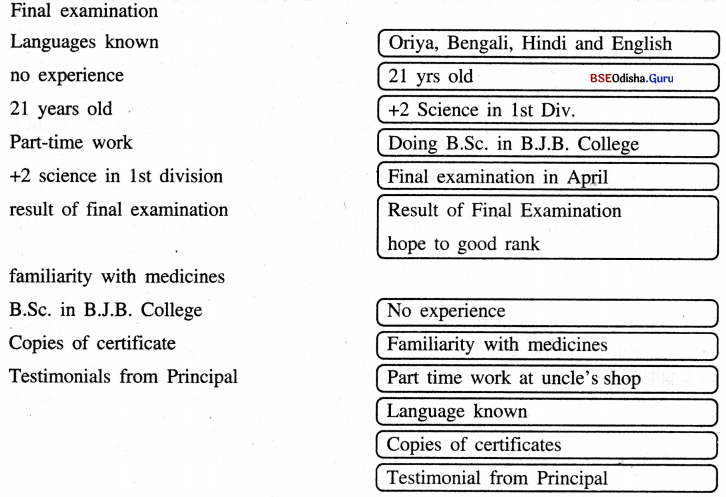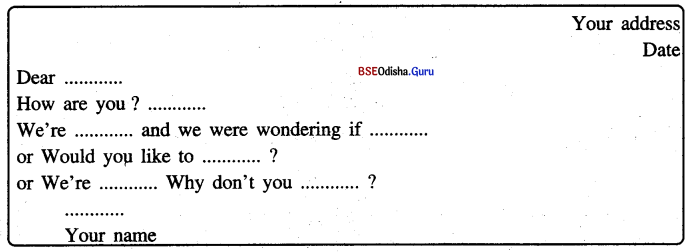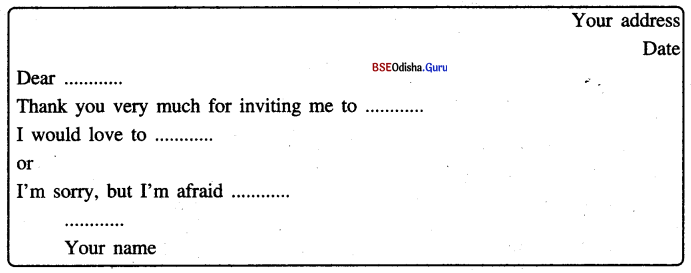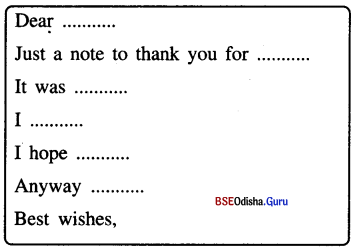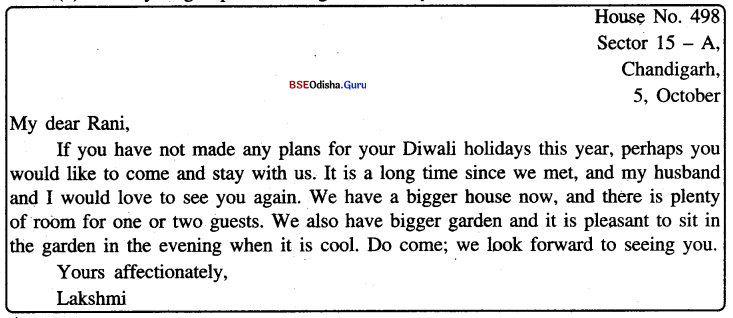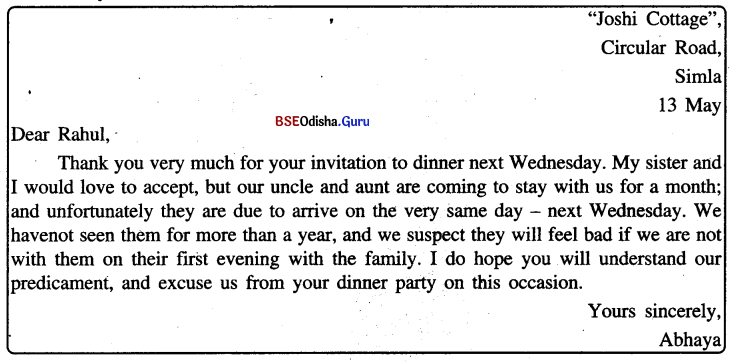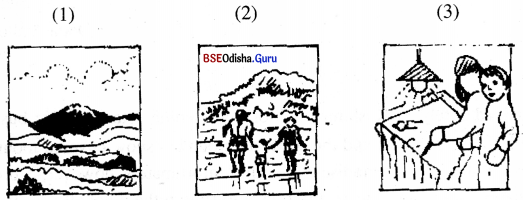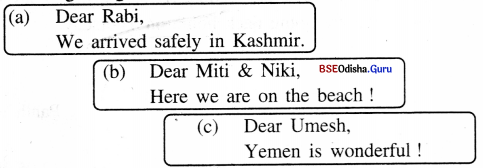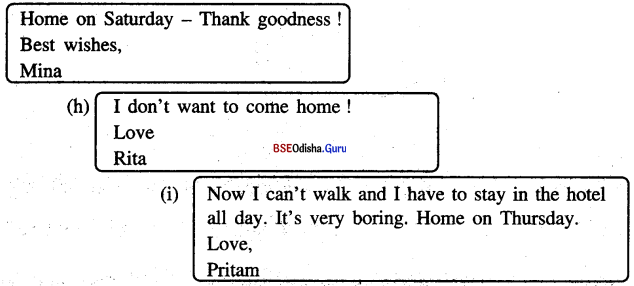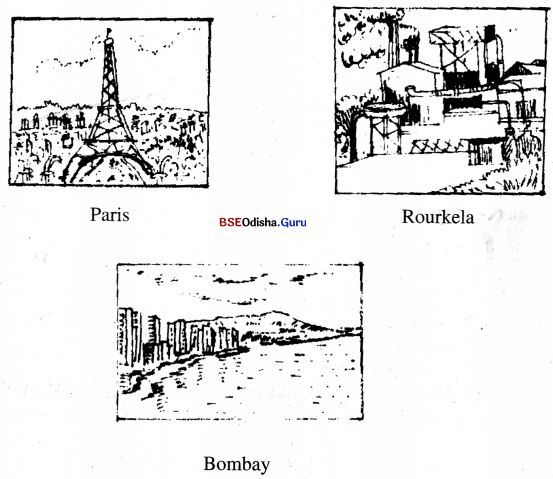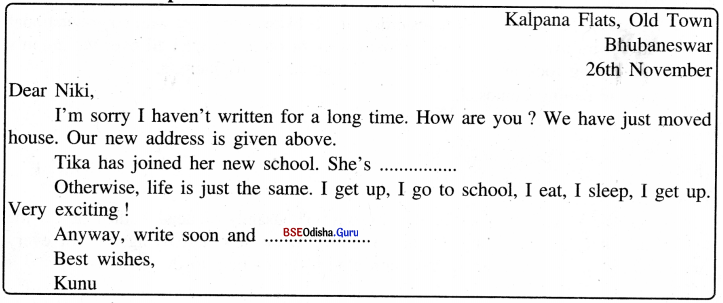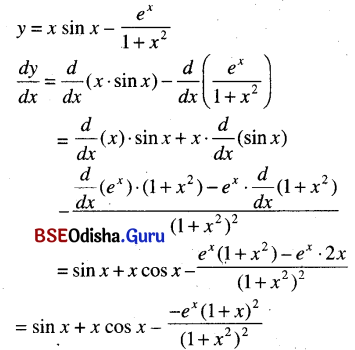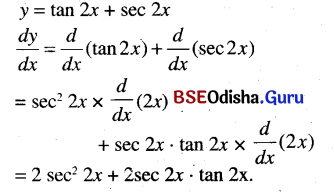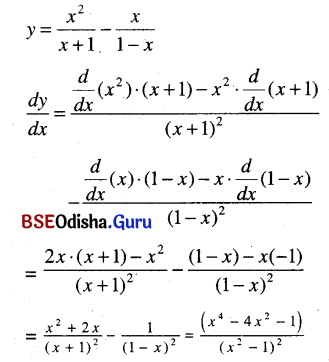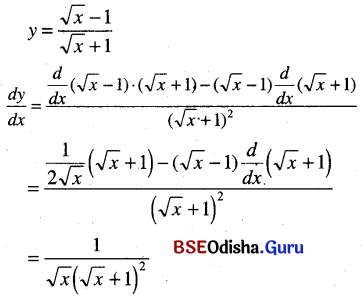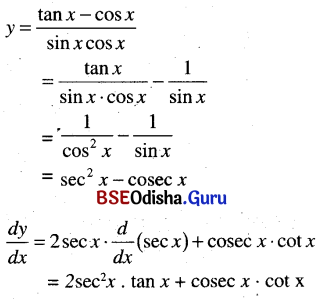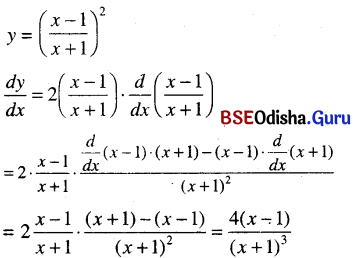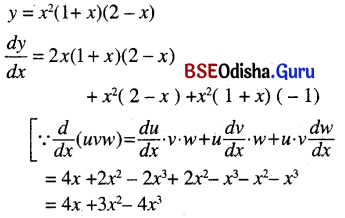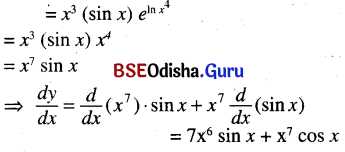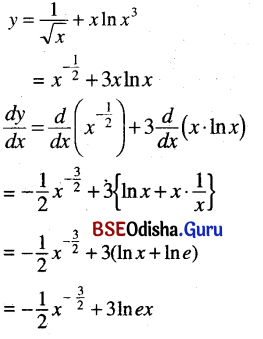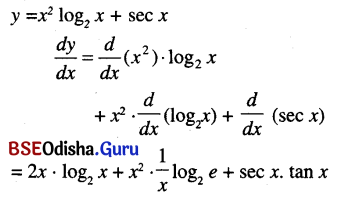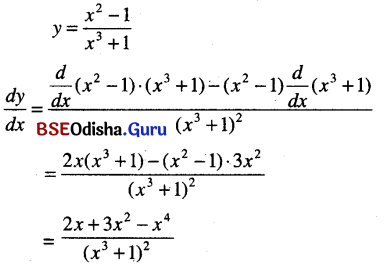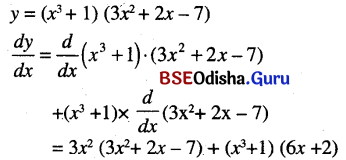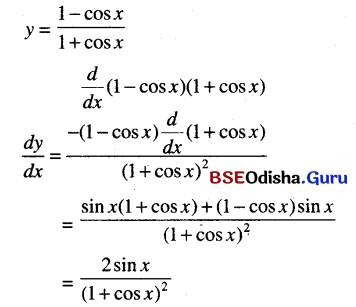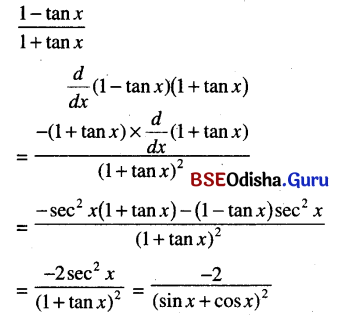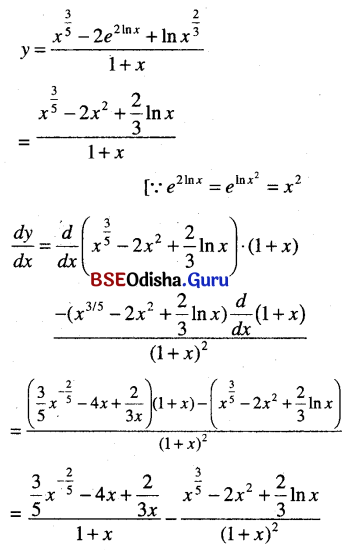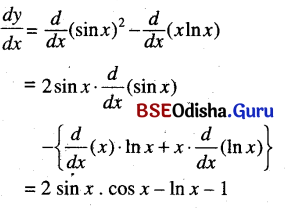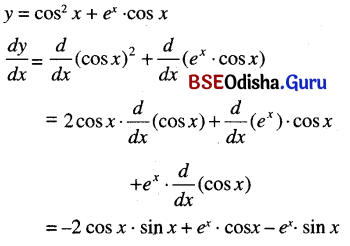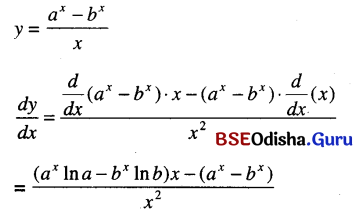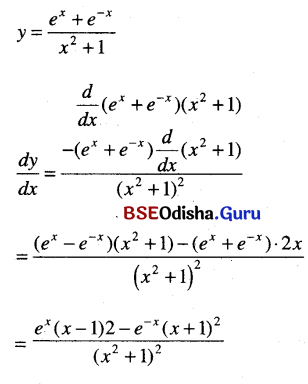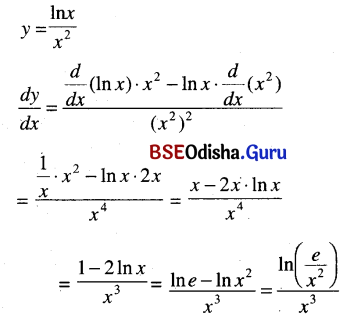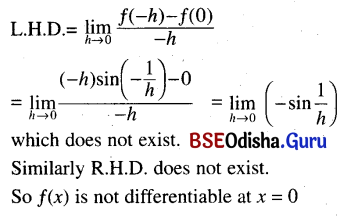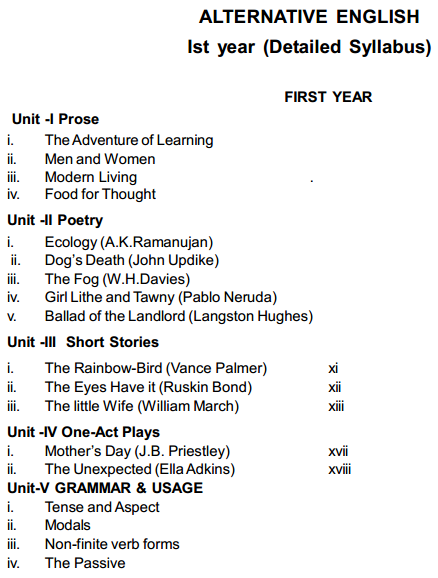Odisha State Board Elements of Mathematics Class 11 CHSE Odisha Solutions Chapter 16 Probability Ex 16(a) Textbook Exercise Questions and Answers.
CHSE Odisha Class 11 Math Solutions Chapter 16 Probability Exercise 16(a)
Question 1.
A coin was tossed twice. Find the probability of getting.
(i) exactly one head
Solution:
A coin is tossed twice.
∴ S = {HH, HT, TH, TT}, |S| = 4
Let A be the event of getting exactly one head.
∴ A = {HT, TH} ⇒ |A| = 2
∴ P(A) = \(\frac{|\mathrm{A}|}{|\mathrm{S}|}=\frac{2}{4}=\frac{1}{2}\)
(ii) at least one head
Solution:
Let B be the event of getting at least one head.
∴ B = {HT, TH, HH}
∴ |B| = 3
∴ P(B) = \(\frac{|\mathrm{B}|}{|\mathrm{S}|}=\frac{3}{4}\)
(iii) at most one head
Solution:
Let C be the events of getting at most one head
∴ C = {HT, TH, TT} ⇒ |C| = 3
∴ P(C) = \(\frac{|C|}{|S|}=\frac{3}{4}\)
Question 2.
A coin is tossed three times. Find the probability of getting.
Solution:
A coin is tossed three times.
∴ S = {HHH, HTT, HTH, THH, TTH, THT, HHT, TTT}
∴ |S| = 8
(i) all heads
Solution:
Let A be the event of getting all heads.
∴ A = {HHH} ⇒ O(A) = 1
∴ P(A) = \(\frac{|\mathrm{A}|}{|\mathrm{S}|}=\frac{1}{8}\)
(ii) at most 2 heads
Solution:
Let B be the event of getting at most 2 heads.
∴ B = {HTT, HTH, THH, TTH, THT, HHT, TTT} ⇒ |B| = 7
∴ P(B) = \(\frac{|\mathrm{B}|}{|\mathrm{S}|}=\frac{7}{8}\)
(iii) at least 2 heads.
Solution:
Let C be the event of getting at least 2 heads.
∴ C = {HTH, THH, HHT, HHH} ⇒ |C| = 4
∴ P(C) = \(\frac{|\mathrm{C}|}{|\mathrm{S}|}=\frac{4}{8}=\frac{1}{2}\)

Question 3.
List all possible outcomes when a die is rolled twice or a pair of dice is rolled once. Then find the probability that
Solution:
A die is rolled twice
∴ S = {(1, 1), (1, 2), (1, 3), (1, 4), (1, 5), (1, 6), (2, 1), (2, 2), (2, 3), (2, 4), (2, 5), (2, 6), (3, 1), (3, 2), (3, 3), (3, 4), (3, 5), (3, 6), (4, 1), (4, 2), (4, 3), (4, 4), (4, 5), (4, 6), (5, 1), (5, 2), (5, 3), (5, 4), (5, 5), (5, 6), (6, 1), (6, 2), (6, 3), (6, 4), (6, 5), (6, 6)}
∴ |S| = 36
(i) Sum of points is 10
Solution:
Let A be the event of getting the sum 10.
∴ A = {(4, 6), (5, 5), (6, 4)} ⇒ |A| = 3
∴ P(A) = \(\frac{3}{16}=\frac{1}{12}\)
(ii) sum of points is at least 10
Solution:
Let B be the event of getting the sum at least 10.
∴ B = {(4, 6), (5, 5), (6, 4) (5, 6) (6, 5) (6, 6)} ⇒ |B| = 6
∴ P(B) = \(\frac{|\mathrm{B}|}{|\mathrm{S}|}=\frac{3}{36}=\frac{1}{6}\)
(iii) sum of points is at most 10.
Solution:
Let C be the event of getting the sum 11 or 12.
∴ C = {(5, 6), (6, 5), (6, 6)} ⇒ |C| = 3
The C is the event of getting the sum at most 10.
∴ P(C’) = 1 – P(C’) = 1 – \(\frac{3}{36}=\frac{33}{36}\)
Question 4.
A die rolled twice. Find the probability that the result of the first roll exceeds the result of the second roll by
Solution:
A die rolled twice S = \(\left\{\begin{array}{llllll}
1 & 2 & 3 & 4 & 5 & 6 \\
1 & 2 & 3 & 4 & 5 & 6
\end{array}\right\}\)
∴ |S| = 36
(i) 3
Solution:
Let A be the event of getting the 1st roll exceeds the result of the 2nd roll by 3.
∴ A = {(4, 1), (5, 2), (6, 3)} ⇒ |A| = 3
∴ P(A) = \(\frac{|\mathrm{A}|}{|\mathrm{S}|}=\frac{3}{36}=\frac{1}{12}\)
(ii) at least 3
Solution:
Let B be the event of getting the 1st roll exceeds the result of the second roll by at least 3.
∴ B = {(4, 1), (5, 2), (6, 3), (5,1), (6, 2), (6, 1)}
∴ P(B) = \(\frac{|\mathrm{B}|}{|\mathrm{S}|}=\frac{6}{36}=\frac{1}{6}\)
(iii) at most 3
Solution:
Let A be the event of getting the 1st roll exceeds the result of the 2nd roll by 4 or 5.
∴ A ={(5, 1), (6, 2), (6, 1)}
P(A’) = 1 – P(A) = 1 – \(\frac{|A|}{|S|}\)
= 1 – \(\frac{3}{36}=\frac{33}{36}=\frac{11}{12}\)
Question 5.
A card is selected from 100 cards numbered 1 to 100. If a card is selected at random, find the probability that the number on the card is
Solution:
A card is selected from 100 cards numbered 1 to 100.
∴ |S| = 100
(i) divisible by 5
Solution:
Let A be the event of getting the card whose number is divisible by 5.
∴ A = {5, 10, 15, 20, ….. 10} ⇒ |A| = 20
∴ P(A) = \(\frac{|\mathrm{A}|}{|\mathrm{S}|}=\frac{20}{100}=\frac{1}{5}\)
(ii) divisible by 2
Solution:
Let B be the event of getting the card whose number is divisible by 2.
∴ B = {2, 4, 6, 8,…., 100} ⇒ |B| = 50
∴ P(B) = \(\frac{|B|}{|S|}=\frac{50}{100}=\frac{1}{2}\)
(iii) divisible by both 2 and 5
Solution:
If a number is divisible by both 2 and 5 then it is divisible by 10. Let A be a such an event.
∴ A ={10, 20, 30,……,100} ⇒ |A| = 10
∴ P(A) = \(\frac{|\mathrm{A}|}{|\mathrm{S}|}=\frac{10}{100}=\frac{1}{10}\)
(iv) divisible by either 2 or 5.
Solution:
Let A be the event of getting the number divisible by 2 and B be the event of getting the number divisible by 5.
∴ A = {2, 4, 6,……… 100}
B = {5, 10, 15, 20, ……, 100}
∴ A ∩ B = {10, 20, 30, ….., 100} ⇒ A ∩ B = 10
∴ P(A ∪ B) = P(A) + P(B) – P(A ∩ B)
= \(\frac{|\mathrm{A}|}{|\mathrm{S}|}+\frac{|\mathrm{B}|}{|\mathrm{S}|}-\frac{|\mathrm{A} \cap \mathrm{B}|}{|\mathrm{S}|}\)
= \(\frac{50}{100}+\frac{20}{100}-\frac{10}{100}=\frac{60}{100}=\frac{3}{5}\)

Question 6.
Eight persons stand in a line at random. What is the probability that two person X and Y don’t stand together?
Solution:
Eight persons stand in a line at random.
∴ |S| = 8!
Let A be the event that two persons X and Y stand together. Considering X and Y as one person, the total number of persons is 7, who can stand in 7 ! × 2 ways.
∴ |A| = 2 × 7 !
∴ P(A) = \(\frac{|\mathrm{A}|}{|\mathrm{S}|}=\frac{2 \times 7 !}{8 !}=\frac{1}{4}\)
∴ P(A’) = 1 – P(A) = 1 – \(\frac{1}{4}=\frac{3}{4}\)
Question 7.
What is the probability that four aces appear together when a pack of 52 cards is shuffled completely?
Solution:
Let A be the event of getting four aces appearing together. Then considering the four aces as one card, the total number of cards is 49, which can be shuffled in 49! × 4! ways.
∴ P(A) = \(\frac{|\mathrm{A}|}{|\mathrm{S}|}=\frac{4 ! \times 49 !}{52 !}\)
Question 8.
If 8 persons are to sit around a table, what is the probability that X and Y don’t sit together?
Solution:
If 8 persons sit in a round table then the number of ways is (8 – 1)!
∴ |S| = (8 – 1)! = 7!
Let A be the event of getting that X and Y sit together. Considering X and Y as one person, the total number of persons is 7, who can be sit in 2 × 6 ! ways.
∴ P(A) = \(\frac{|\mathrm{A}|}{|\mathrm{S}|}=\frac{2 ! \times 6 !}{7 !}=\frac{2}{7}\)
P(A’) = 1 – P(A) = 1 – \(\frac{2}{7}=\frac{5}{7}\)
Question 9.
A die is rolled three times. Find the probability that the numbers obtained are in strictly increasing order.
Solution:
A die is rolled three times.
|S| = 63 = 216
Let A be the event of getting the numbers in strictly increasing order.
A = {(1, 2, 3), (1, 2, 4), (1, 2, 5), (1, 2, 6), (1, 3, 4), (1, 3, 5), (1, 3, 6), (1, 4, 5), (1, 4, 6), (1, 5, 6), (2, 3, 4), (2, 3, 5), (2, 3, 6), (2, 4, 5), (2, 4, 6), (2, 5, 6), (3, 4, 5), (3, 5, 6), (4, 5, 6), (3, 4, 6)} ⇒ |A| = 20
∴ P(A) = \(\frac{|\mathrm{A}|}{|\mathrm{S}|}=\frac{20}{216}\)
Question 10.
Three phonorecords are removed from their jackets, played with, and then returned to the jackets at random. Find the probability that
Solution:
Three phonorecords are removed from their jackets, played with, and returned to the jackets at random. Let the records be numbered 1, 2, and 3, and let their jackets be similarly numbered 1, and 2,3. The number of ways in which the records can be put in their jackets is 3! = 6.
S = \(\left\{\left(\begin{array}{lll}
1 & 2 & 3 \\
1 & 2 & 3
\end{array}\right),\left(\begin{array}{lll}
1 & 2 & 3 \\
2 & 3 & 1
\end{array}\right),\left(\begin{array}{lll}
1 & 2 & 3 \\
3 & 1 & 2
\end{array}\right),\left(\begin{array}{lll}
1 & 2 & 3 \\
1 & 3 & 2
\end{array}\right),\right.\)
\(\left.\left(\begin{array}{lll}
1 & 2 & 3 \\
3 & 2 & 1
\end{array}\right),\left(\begin{array}{lll}
1 & 2 & 3 \\
2 & 1 & 3
\end{array}\right)\right\}\)
(i) none of the records goes to the right jacket
Solution:
Let A be the event that none of the records goes to the right jacket.
∴ A = \(\left\{\left(\begin{array}{lll}
1 & 2 & 3 \\
2 & 3 & 1
\end{array}\right),\left(\begin{array}{lll}
1 & 2 & 3 \\
3 & 1 & 2
\end{array}\right)\right\}\)
∴ P(A) = \(\frac{|\mathrm{A}|}{|\mathrm{S}|}=\frac{2}{6}=\frac{1}{3}\)
(ii) just one record goes to the right jacket.
Solution:
Let A be the event that none of the records goes to the right jacket.
∴ A = \(\left\{\left(\begin{array}{lll}
1 & 2 & 3 \\
1 & 3 & 2
\end{array}\right),\left(\begin{array}{lll}
1 & 2 & 3 \\
3 & 2 & 1
\end{array}\right),\left(\begin{array}{lll}
1 & 2 & 3 \\
2 & 1 & 3
\end{array}\right)\right\}\)
∴ P(A) = \(\frac{|\mathrm{A}|}{|\mathrm{S}|}=\frac{3}{6}=\frac{1}{2}\)
(iii) just two records go to the right jackets.
Solution:
Let B be the event that just two records goes to the right jackets. When two records goes to the right jackets, then it is obvious that the 3rd jacket must go to the right jacket.
∴ B = Φ
∴ P(B) = 0
(iv) all three of them go to the right jackets.
Solution:
Let C be the event that all 3 of them go to the right jackets.
∴ C = \(\left\{\left(\begin{array}{lll}
1 & 2 & 3 \\
1 & 2 & 3
\end{array}\right)\right\}\)
∴ P(C) = \(\frac{|\mathrm{C}|}{|\mathrm{S}|}=\frac{1}{6}\)

Question 11.
Four records are taken out of their jackets, played and returned to the jackets at random. Find the probability that
Solution:
Four records are taken out of their jackets, played and returned to the jackets at random.
∴ The number of ways in which the records can be put is 4!
∴ |S| = 24
(i) none of the records goes into the right jacket.
Solution:
Let the records and jackets be denoted as R1, R2, R3, R4, and J1, J2, J3, J4, respectively.
Considering \(\left(\begin{array}{llll}
\mathrm{R}_1 & \mathrm{R}_2 & \mathrm{R}_3 & \mathrm{R}_4 \\
\mathrm{~J}_2 & \mathrm{~J}_1 & \mathrm{~J}_4 & \mathrm{~J}_3
\end{array}\right),\left(\begin{array}{llll}
\mathrm{R}_1 & \mathrm{R}_2 & \mathrm{R}_3 & \mathrm{R}_4 \\
\mathrm{~J}_2 & \mathrm{~J}_4 & \mathrm{~J}_1 & \mathrm{~J}_3
\end{array}\right)\)
\(\left(\begin{array}{llll}
\mathrm{R}_1 & \mathrm{R}_2 & \mathrm{R}_3 & \mathrm{R}_4 \\
\mathrm{~J}_2 & \mathrm{~J}_3 & \mathrm{~J}_4 & \mathrm{~J}_1
\end{array}\right)\)
∴ When R1 be put in J2, there are 2 such cases. Similarly when R1 be put in J3 and J4 the number of such cases is 3 each.
∴ The total number of ways in which none of the records goes to the right jackets is 3 × 3 = 9.
∴ Its probability = \(\frac{15}{24}=\frac{5}{8}\)
(ii) at least one record is put in the right jacket.
Solution:
The number of ways in which at least one record goes to the right jacket, i.e. 1, 2, 3 of 4 records goes to the right jacket is 24 – 9 = 15.
∴ ItS probability = \(\frac{15}{24}=\frac{5}{8}\)
Question 12.
Let A and B be events with P(A) = \(\frac{3}{8}\), P(B) = \(\frac{1}{2}\) and P(A ∩ B) = \(\frac{1}{4}\). Find
(i) P(A ∪ B)
Solution:
P(A ∪ B) = P(A) + P(B) – P(A ∩ B)
= \(\frac{3}{8}+\frac{1}{2}-\frac{1}{4}=\frac{3+4-2}{8}=\frac{5}{8}\)
(ii) P(Ac) and P(Bc)
Solution:
P(Ac) = 1 – P(A) = 1 – \(\frac{3}{8}=\frac{5}{8}\)
P(Bc) = 1 – P(B) = 1 – \(\frac{1}{2}=\frac{1}{2}\)
(iii) P(Ac ∪ Bc)
Solution:
P(Ac ∪ Bc) = P(A ∩ B)c = 1 – (A ∩ B)
= 1 – \(\frac{1}{4}=\frac{3}{4}\)
(iv) P(Ac ∩ Bc)
Solution:
P(Ac ∩ Bc) = P(A ∪ B)c = 1 – (A ∪ B)
= 1 – \(\frac{5}{8}=\frac{3}{8}\)
(v) P(A ∩ Bc)
Solution:
P(A ∩ Bc)
= P(A – B) = P(A) – P(A ∩ B)
= \(\frac{3}{8}-\frac{1}{4}=\frac{3-2}{8}=\frac{1}{8}\)
(vi) P(Ac ∩ B)
Solution:
P(Ac ∩ B)
= P(B – A) = P(B) – P(A ∩ B)
= \(\frac{1}{2}-\frac{1}{4}=\frac{1}{4}\)
Question 13.
Let A and B be the events with P(A) = \(\frac{1}{3}\) P(A ∪ B) = \(\frac{3}{4}\) and P(A ∩ B) = \(\frac{1}{4}\), Find
(i) P(A)
Solution:
P(A) = \(\frac{1}{3}\)
(ii) P(B)
Solution:
we have
P(A ∪ B) = P(A) + P(B) – P(A ∩ B)
or, \(\frac{3}{4}=\frac{1}{3}\) +P(B) – \(\frac{1}{4}\)
or, P(B) = \(\frac{3}{4}+\frac{1}{4}-\frac{1}{3}=1-\frac{1}{3}=\frac{2}{3}\)
P(A’) = 1 – P(A) = 1 – \(\frac{1}{3}=\frac{2}{3}\)
(iii) P(A ∩ Bc)
Solution:
P(A ∩ Bc) = P(A – B) = P(A) – P(A ∩ B)
= \(\frac{1}{3}-\frac{1}{4}=\frac{4-3}{12}=\frac{1}{12}\)
(iv) P(A ∪ Bc)
Solution:
P(A ∪ Bc) = 1 – P(A ∪ Bc)c
= 1 – P(Ac ∪ B) = 1 – P(B – A)
= 1 – P(B) + P(A ∩ B)
= 1 – \(\frac{2}{3}+\frac{1}{4}=\frac{12-8+3}{12}=\frac{7}{12}\)

Question 14.
There are 20 defective bulbs in a box of 100 bulbs. If 10 bulbs are chosen at random what is the probability that
Solution:
There are 20 defective bulbs in a box of 100 bulbs. If 10 bulbs are chosen at random.
(i) there are just 3 defective bulbs
Solution:
|S| = 100C10
The number of defective bulbs is 20 so that the number of non-defective bulbs is 80.
Let A be the event of getting defective bulbs.
∴ |A| = 20C3 × 80C7
∴ P(A) = \(\frac{|\mathrm{A}|}{|\mathrm{S}|}=\frac{{ }^{20} \mathrm{C}_3 \times{ }^{80} \mathrm{C}_7}{{ }^{100} \mathrm{C}_{10}}\)
(ii) there are at least 3 defective balls.
Solution:
Let B be the event of getting at least 3 defective bulbs.
∴ B’ is the event of getting at most 2 defective bulbs.
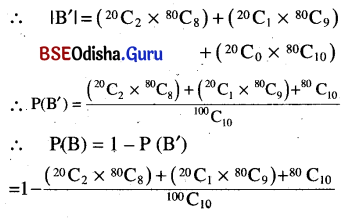
Question 15.
A pair of dice is rolled once. Find the probability that the maximum of the two numbers
Solution:
A pair of dice is rolled once.
∴ S = \(\left\{\begin{array}{llllll}
1 & 2 & 3 & 4 & 5 & 6 \\
1 & 2 & 3 & 4 & 5 & 6
\end{array}\right\}\)
∴ |S| = 62 = 36
(i) is greater than 4
Solution:
A be the event of getting the maximum of two numbers greater than 4.
|A| = 20
∴ P(A) = \(\frac{20}{36}\)
(ii) is 6.
Solution:
Let A be the event of getting the maximum of two numbers is 6.
∴ A ={(1, 1), (1, 2), (1, 3), (1, 4), (1, 5), (2, 1), (2, 2), (2, 3), (2, 4), (3, 1), (3, 2), (3, 3), (4, 1), (4, 2), (5, 1)}
∴ P(A) = \(\frac{|\mathrm{A}|}{|\mathrm{IS}|}=\frac{15}{36}\)
Question 16.
4 girls and 4 boys sit in a row. Find the probability that
Solution:
4 girls and 4 boys sit in a row.
∴ |S| = 8 !
(i) the four girls are together
Solution:
Let A be the event that 4 girls are together. Considering 4 girls as one, the total number of children is 5 which can be sit in 5! × 4! ways.
∴ |A| = 5! × 4!
∴ P(A) = \(\frac{\mid \mathrm{Al}}{|\mathrm{S}|}=\frac{5 ! \times 4 !}{8 !}\)
(ii) the boys and girls sit in alternate seats.
Solution:
When the boys and girls sit in alternate positions. So the arrangement can be as follows:
BC1BC1BC1BC1
C1BC1BC1BC1B
∴ The total number of ways = 2(4! × 4!)
∴ Its probability = \(\frac{2 \times 4 ! \times 4 !}{8 !}\)
Question 17.
A committee of 3 is to be chosen from among 10 people including X and Y. Find the probability that
Solution:
A committee of 3 is to be chosen from among 10 people including X and Y.
∴ |S| = 10C3
(i) X is the committee
Solution:
Let A be the event that X is in the committee. So we have chosen 2 persons from 9 persons in 9C2 ways
∴ |A| = 9C2
∴ P(A) = \(\frac{|\mathrm{A}|}{|\mathrm{S}|}=\frac{{ }^9 \mathrm{C}_2}{{ }^{10} \mathrm{C}_3}\)
(ii) X or Y belongs to the committee
Solution:
Let B be the event that X or Y belongs to the committee,
When X is in the committee, its probability = \(\frac{{ }^9 C_2}{{ }^{10} C_3}\)
When Y is the in the committee, its probability = \(\frac{{ }^9 C_2}{{ }^{10} C_3}\)
When X and Y both are in the committee, its probability = \(\frac{8 \mathrm{C}_1}{{ }^{10} \mathrm{C}_3}\)
∴ Probability that X or Y is in the committee
= \(\frac{{ }^9 \mathrm{C}_2+{ }^9 \mathrm{C}_2-{ }^8 \mathrm{C}_1}{{ }^{10} \mathrm{C}_3}=\frac{2 \times{ }^9 \mathrm{C}_2-{ }^8 \mathrm{C}_1}{{ }^{10} \mathrm{C}_3}\)
(iii) X and Y belong to the committee.
Solution:
When X and Y are both in the committee, we have to choose 1 person from 8 persons in 8C1 ways.
∴ Its probability = \(\frac{{ }^8 \mathrm{C}_1}{{ }^{10} \mathrm{C}_3}\)

Question 18.
A class consists of 25 boys and 15 girls. If a committee of 6 is to be chosen at random, find the probability that
Solution:
A class consists of 25 boys and 15 girls. A committee of6 is to be chosen at random.
∴ |S| = 40C6
(i) all members of the committee are girls.
Solution:
Let A be the event of getting all members of the committee are girls.
∴ |A| = 40C6
∴ P(A) = \(\frac{|\mathrm{A}|}{|\mathrm{S}|}=\frac{{ }^{15} \mathrm{C}_6}{{ }^{40} \mathrm{C}_6}\)
(ii) all members of the committee are boys.
Solution:
If all members of the committee are boys, then its probability = \(\frac{{ }^{25} \mathrm{C}_6}{{ }^{40} \mathrm{C}_6}\)
(iii) there are exactly 3 boys in the committee.
Solution:
Let A be the event of getting exact 3 boys in the committee.
∴ |A| = 25C3 × 15C3
∴ P(A) = \(\frac{{ }^{25} \mathrm{C}_3 \times{ }^{15} \mathrm{C}_3}{{ }^{40} \mathrm{C}_6}\)
(iv) there are exactly 4 girls in the committee.
Solution:
Let B the event of getting exactly 4 girls in the committee.
∴ |B| = 15C4 × 25C2
∴ P(B) = \(\frac{{ }^{15} \mathrm{C}_4 \times{ }^{25} \mathrm{C}_2}{{ }^{40} \mathrm{C}_6}\)
(v) there is at least one girl in the committee.
Solution:
Let C be the event of getting at least one girl in the committee.
∴ C’ is the event of getting no girl in the committee.
∴ |C’| = 25C6 ∴ P|C’| = \(\frac{\left|\mathrm{C}^{\prime}\right|}{|\mathrm{S}|}\)
∴ P(C) = 1 – P(C’) = 1 – \(\frac{{ }^{25} \mathrm{C}_6}{{ }^{40} \mathrm{C}_6}\)
Question 19.
There are 20 boys and 10 girls in the class. If a committee of 6 is to be chosen at random having at least 2 boys and 2 girls, find the probability that
Solution:
There are 20 boys and 10 girls in the class. A committee of 6 is to be chosen at random having at least 2 boys and 2 girls.
| (20) Boys |
(10) girls |
| 2 |
4 |
| 3 |
3 |
| 4 |
2 |
∴ |S| = (20C2 × 10C4) + (20C3 × 10C3) + (20C4 × 10C2)
(i) there are 3 boys in the committee.
Solution:
When there are 3 boys in the committee, its probability = \(\frac{{ }^{20} \mathrm{C}_3 \times{ }^{10} \mathrm{C}_3}{|\mathrm{~S}|}\)
(ii) there are 4 boys in the committee.
Solution:
When there are 4 boys in the committee, its probability = \(\frac{{ }^{20} \mathrm{C}_4 \times{ }^{10} \mathrm{C}_2}{|\mathrm{~S}|}\)
Question 20.
There are 120 students in a class who have opted for the following MIL. English 20, Oriya 70, Bengali 30. If a student is chosen at random, find the probability that the student is studying.
Solution:
There are 120 students in a class who have opted for the English 20, Oriya 70, Bengali 30.
∴ |S| = 120.
Let Be be the event of getting Bengali and E be the event of getting English.
(i) Bengali or English
Solution:
Since B and E are mutually exclusive events.
P(B ∪ E) = P(B) + P(E)
= \(\frac{|\mathrm{B}|}{|\mathrm{S}|}+\frac{|\mathrm{E}|}{|\mathrm{S}|}=\frac{30}{120}+\frac{20}{120}=\frac{50}{120}\)
(ii) neither Bengali nor English.
Solution:
Let A be the event of getting neither Bengali nor English, i.e. A is the event of getting Odia only.
∴ P(A) = \(\frac{|\mathrm{A}|}{|\mathrm{S}|}=\frac{70}{120}\)
Question 21.
Sometimes, probability of an event A is expressed as follows. We say that odds in favour of A are x toy if P(A) = \(\frac{x}{x+y}\). Similarly, we say that odds against A are x to y if P(A) = \(\frac{y}{x+y}\). Find P(A) and P(A)c if
Solution:
Odds in favour of A are x to y if P(A) = \(\frac{x}{x+y}\)
Odds against A are x to y if P (A) = \(\frac{y}{x+y}\)
(i) odds in favour of A are 2 to 5.
Solution:
P(A) = \(\frac{x}{x+y}\) = \(\frac{2}{2+5}=\frac{2}{7}\)
and P(A’) = 1 – P(A) = 1 – \(\frac{2}{7}=\frac{5}{7}\)
(ii) odds against A are 4 to 3.
Solution:
P(A) = \(\frac{3}{4+3}=\frac{3}{7}\)
P(A’) = 1 – P(A) = 1 – \(\frac{3}{7}=\frac{4}{7}\)
Question 22.
Six dice are rolled. Find the probability that all six faces show different numbers.
Solution:
Six dice are rolled once.
∴ |S| = 66
Let A be the event that all six faces show different numbers.
∴ |S| = 6!
∴ P(A) = \(\frac{6 !}{6^6}\)

Question 23.
There are 60 tickets in a bag numbered 1 through 60. Ifa ticket is picked at random, find the probability that the number on it is divisible by 2 or 5 and is not divisible by any of the numbers 3, 4, 6.
Solution:
There are 60 tickets in a bag numbered 1 through 60. A ticket is to be chosen, whose number is divisible by 2 or 5 and is not divisible by 3, 4, 6.
∴ |S| = 6 !
Let A be the event of getting the numbers divisible by 2 but not divisible by 3, 4, 6.
B be the event of getting* the numbers divisible by 5 but not divisible by 3, 4, 6.
∴ A = {2, 10, 14, 22, 26, 34, 38, 46, 50, 58}
B = {5, 10, 25, 35, 50, 55}
A ∩ B = {10, 50}
∴ P(A ∪ B) = P(A) + P (B) – P (A ∩ B)
= \(\frac{10+6-2}{60}=\frac{14}{60}\)
Question 24.
Compute P (A Δ B) in terms of P (A), P (B) and P (A ∩ B) where A Δ B denotes the symmetric difference of A and B.
Solution:
P (A Δ B) = P[(A – B)∪ (B – A)]
= P (A – B) + P (B – A) as (A – B) n (B – A) = Φ
= P[A – (A ∩ B)]+ P[B – (A ∩ B)]
= P(A) – P(A ∩ B) + P(B) – P(A ∩ B)
= P(A) + P(B) – 2P(A ∩ B)
Question 25.
Three volumes of a book and five volumes of another book are placed at random on a book shelf. Find the probability that all volumes of both the books will be found together.
Solution:
Three volumes of a book and five volumes of another book are placed at random on a book shelf.
∴ |S| = 8 !
When all volumes of both the books will find together, then considering the volumes as one book each, we have the total number of books is 2, which can be arranged in 2 × 3! × 5!
∴ Its probability = \(\frac{2 \times 3 ! \times 5 !}{8 !}\)
Question 26.
2 black cards and 2 red cards are lying face down on the table, If you guess their colours, find the probability that you get
Solution:
2 black cards and 2 red cards are lying face down on the table.
∴ We can guess their colours in \(\frac{4 !}{2 ! 2 !}\) = 4 ways
Cards kept face down as:
A student can guess:
| (a) |
B |
B |
R |
R |
| (b) |
B |
R |
B |
R |
| (c) |
B |
R |
R |
B |
| (d) |
R |
R |
B |
B |
| (e) |
R |
B |
R |
B |
| (f) |
R |
B |
B |
R |
(i) none of them right
Solution:
A student can guess none of them right only in case (d).
∴ Its probability = \(\frac{1}{6}\)
(ii) two of them right
Solution:
A student can guess two of them right in (b), (c), (d), (f).
∴ Its probability = \(\frac{4}{6}=\frac{2}{3}\)
(iii) all four of them right
Solution:
The student can guess all 4 of them right in (a) only.
∴ Its probability = \(\frac{1}{6}\)
![]()

![]()
![]()
![]()
![]()




